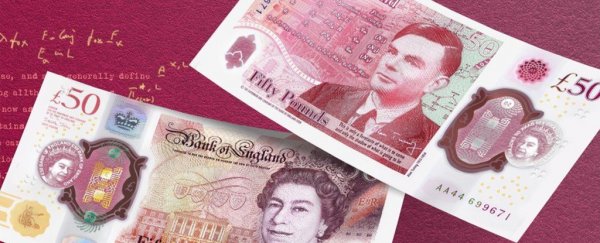The new £50 bank note that's just been unveiled in the UK features the face of Alan Turing on one side – and in tribute to the legendary mathematician and codebreaker, UK intelligence agency GCHQ has set a series of tricky puzzles linked to the note.
According to GCHQ, the 12 riddles should take experienced solvers around seven hours to complete from start to finish. If you want to give them a try, you can find the so-called Turing Challenge online here.
The brain teasers pick out various symbols, signs, and drawings on the bank note, including a representation of Hut 8 – the section in the Government Code and Cypher School (GC&CS) at Bletchley Park where Turing was based during World War II.
Other riddles cover Turing's birthday, which is written in binary on the £50 note, and the foil on the note that has been altered to resemble a microchip, in honor of Turing's work in computer science.
There's also a sunflower on the note, recognizing Turing's interest in morphogenetics, or the study of shape and architecture in plants. This has inspired another of the challenges set by GCHQ.
Other puzzles are based on the British Bombe technical drawings on the note – that's the code-breaking machine Turing used – and a table from Turing's 1936 paper "On Computable Numbers, with an application to the Entscheidungsproblem". That paper eventually led to the idea of the Turing Machine.
As well as issuing the Turing Challenge, GCHQ bosses again acknowledged the appalling ways Turing was treated during his lifetime. He was prosecuted for having a gay relationship, had to undergo chemical castration as a result, and eventually took his own life.
"Turing was embraced for his brilliance and persecuted for being gay," says Jeremy Fleming, the director of GCHQ. "His legacy is a reminder of the value of embracing all aspects of diversity, but also of the work we still need to do to become truly inclusive."
Turing contributed a huge amount to mathematics, computer science, and other fields during his lifetime. His work cracking the codes of the German Enigma machine for the British government probably saved millions of lives by bringing World War II to an earlier end, according to several experts.
Scientists are still making discoveries today that back up theories Turing came up with decades ago. He devised the well-known Turing test for assessing artificial intelligence and co-created the first chess computer program.
The new note goes into circulation on June 23, Turing's birthday, and is the latest UK note to be converted from paper to a polymer; the new material lasts longer and is harder to create counterfeits of.
We should probably leave the last word to Alan Turing himself, which also appears on the £50 bank note. It's something he said of one of the very first computing machines he helped develop, the Manchester Mark 1.
"This is only a foretaste of what is to come and only the shadow of what is going to be," Turing told The Times in 1949 – something else that he got exactly right.
